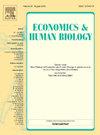Individualism and support for COVID-19 government interventions: The moderating role of perceived economic risk
IF 1.8
3区 医学
Q2 ECONOMICS
引用次数: 0
Abstract
Individualistic orientations in cultural worldviews significantly influence public attitudes toward government policies. We examine the impact and mechanisms of individualism on support for government interventions, focusing on the economic effects of COVID-19 containment measures. Utilizing data from the 10th and the latest 11th rounds of the European Social Survey (ESS), we find that individualism exerts a significant negative effect on public support for COVID-19 government interventions. Specifically, for each additional point increase in individualism corresponds to a 1.6 % decrease in the probability of viewing border closures as extremely important and a 1.4 % decrease for domestic movement restrictions. Our mechanism analysis reveals that individualism negatively affects intervention support by diminishing trust in government. Furthermore, higher perceived economic risk amplifies the negative impact of individualism on intervention support. Heterogeneity tests demonstrate that the negative influence of individualism is more pronounced among older individuals, those with lower income and education levels, employees in government and public sectors, and in non-post-socialist countries. We suggest that strategies to promote public policy support should be tailored to cultural and social contexts.
个人主义与对COVID-19政府干预的支持:感知经济风险的调节作用
文化世界观中的个人主义取向显著影响公众对政府政策的态度。我们研究了个人主义对支持政府干预措施的影响和机制,重点是COVID-19遏制措施的经济影响。利用第10轮和最新的第11轮欧洲社会调查(ESS)的数据,我们发现个人主义对公众对COVID-19政府干预措施的支持产生了显着的负面影响。具体来说,个人主义每增加一个点,将边境关闭视为极其重要的可能性就会降低1.6 %,将国内流动限制视为极端重要的可能性就会降低1.4 %。我们的机制分析表明,个人主义通过降低对政府的信任而对干预支持产生负向影响。此外,较高的感知经济风险放大了个人主义对干预支持的负面影响。异质性检验表明,个人主义的负面影响在老年人、收入和教育水平较低的人、政府和公共部门雇员以及非后社会主义国家中更为明显。我们建议,促进公共政策支持的战略应根据文化和社会背景进行调整。
本文章由计算机程序翻译,如有差异,请以英文原文为准。
求助全文
约1分钟内获得全文
求助全文
来源期刊

Economics & Human Biology
医学-公共卫生、环境卫生与职业卫生
CiteScore
4.50
自引率
12.00%
发文量
85
审稿时长
61 days
期刊介绍:
Economics and Human Biology is devoted to the exploration of the effect of socio-economic processes on human beings as biological organisms. Research covered in this (quarterly) interdisciplinary journal is not bound by temporal or geographic limitations.
 求助内容:
求助内容: 应助结果提醒方式:
应助结果提醒方式:


